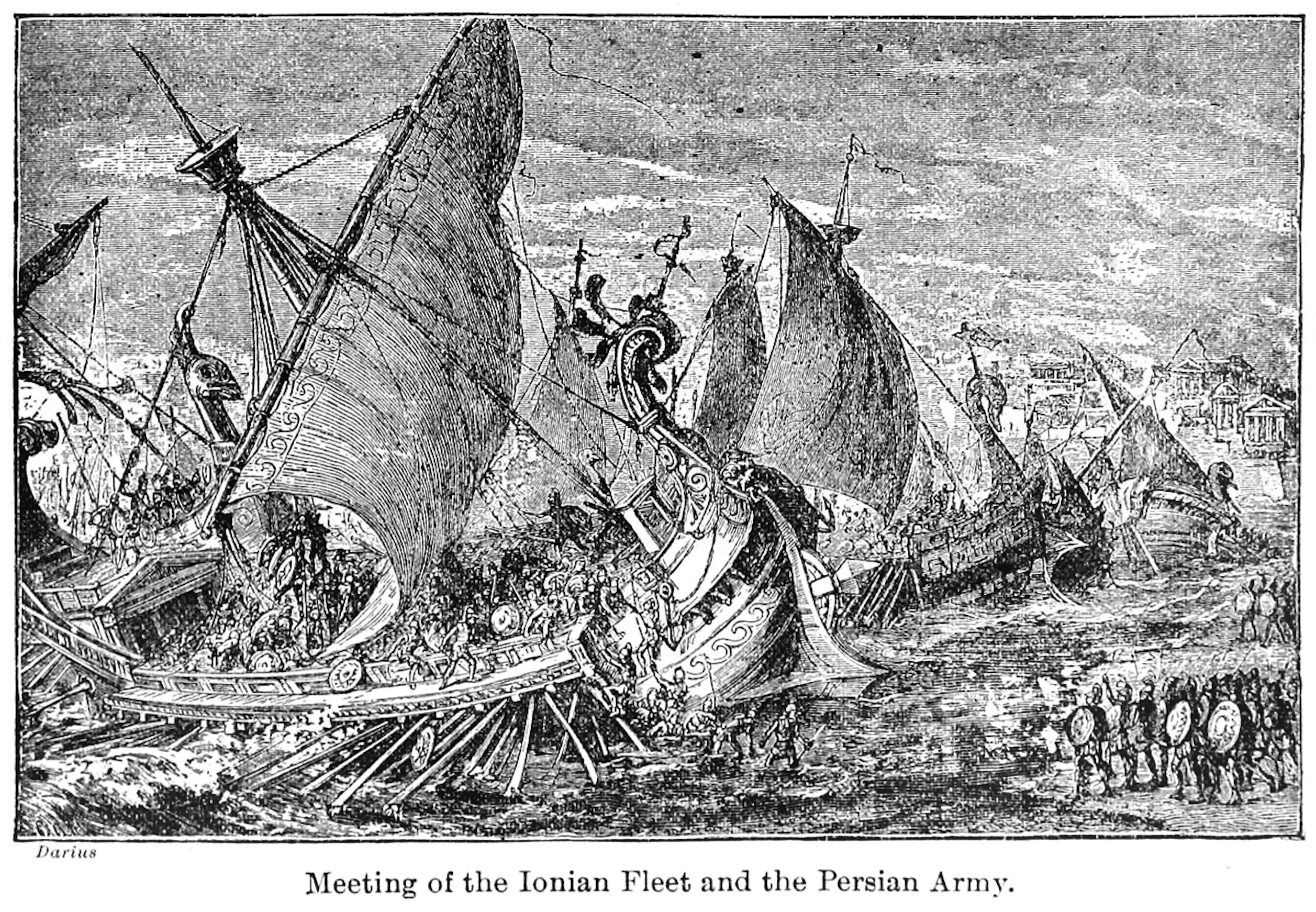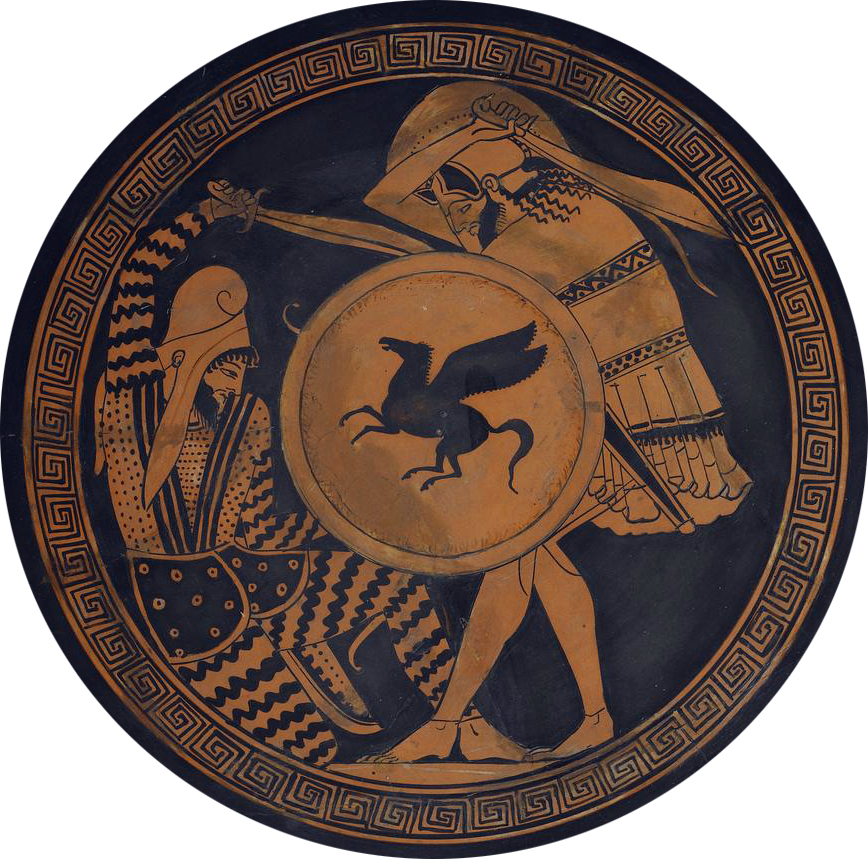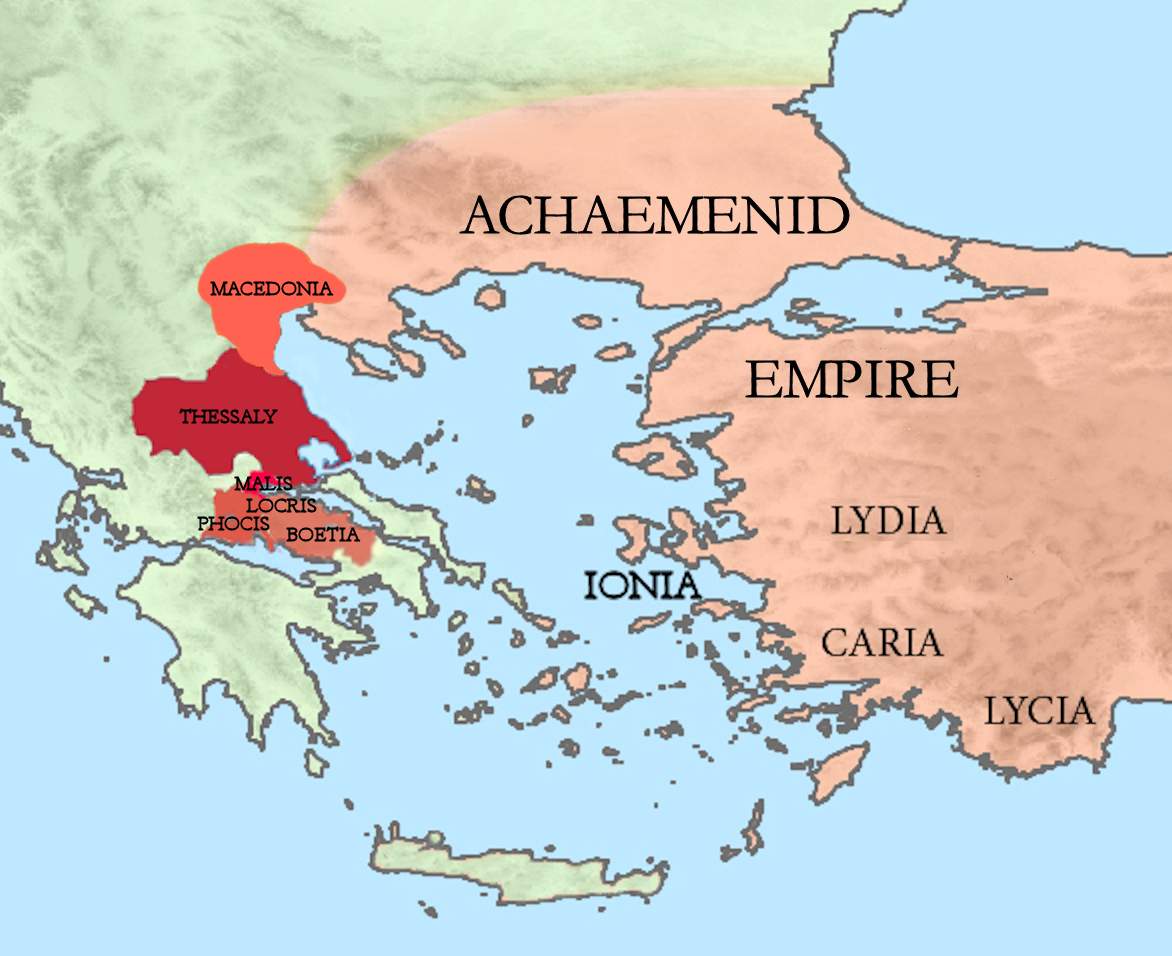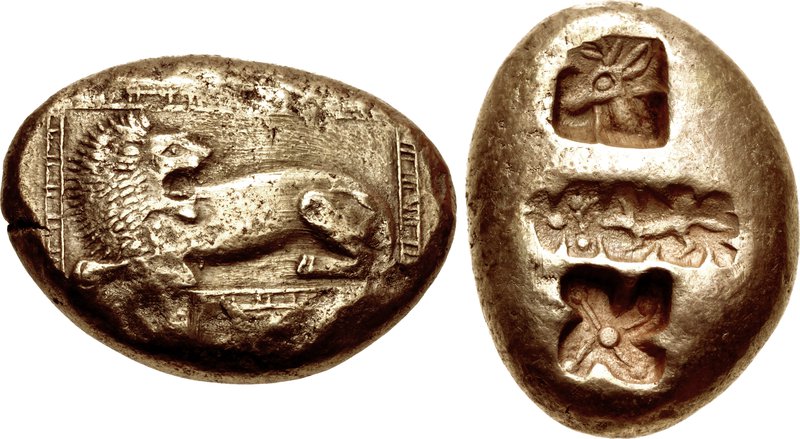|
Ionia (satrapy)
Ionia, known in Old Persian as Yauna ( 𐎹𐎢𐎴), was a region within the satrapy of Lydia, with its capital at Sardis, within the First Persian Empire. The first mention of the Yauna is at the Behistun inscription. History Achaemenid conquest (c. 546 – 479 BC) In the mid-6th century BC, the Ionians were conquered by Cyrus the Great and according to Herodotus, they were placed in the same tax district (the first) as the Pamphylians, Lycians, Magnesians, Aeolians, Milyans, and Carians. It is unclear to what extent the Yauna were advantaged or disadvantaged by Persian rule, and what caused the Ionian Revolt which broke out in c. 499 BC and lasted until 494 BC. The main source, Herodotus, puts it down to the personal ambitions of two men of Miletus, Histiaeus and Aristagoras; modern scholars debate what the underlying reasons may have been; arguments for economic and political causes are variously put forward, but there are no clear sources which can give a definitive answe ... [...More Info...] [...Related Items...] OR: [Wikipedia] [Google] [Baidu] |
Aeolians
The Aeolians (; el, Αἰολεῖς) were one of the four major tribes in which Greeks divided themselves in the ancient period (along with the Achaeans, Dorians and Ionians).. Name Their name mythologically derives from Aeolus, the mythical ancestor of the Aeolians and son of Hellen, the mythical patriarch of the Greek nation; it actually comes from Greek term ''aiolos'' (αίολος) meaning "quickly moving". The dialect of ancient Greek they spoke is referred to as Aeolic. History Originating in Thessaly, a part of which was called Aeolis, the Aeolians often appear as the most numerous amongst the other Hellenic tribes of early times. The Boeotians, a subgroup of the Aeolians, were driven from Thessaly by the Thessalians and moved their location to Boeotia. Aeolian peoples were spread in many other parts of Greece such as Aetolia, Locris, Corinth, Elis and Messinia. During the Dorian invasion, Aeolians from Thessaly fled across the Aegean Sea to the island of Lesbos and ... [...More Info...] [...Related Items...] OR: [Wikipedia] [Google] [Baidu] |
Delian League
The Delian League, founded in 478 BC, was an association of Greek city-states, numbering between 150 and 330, under the leadership of Athens, whose purpose was to continue fighting the Persian Empire after the Greek victory in the Battle of Plataea at the end of the Second Persian invasion of Greece. The League's modern name derives from its official meeting place, the island of Delos, where congresses were held in the temple and where the treasury stood until, in a symbolic gesture, Pericles moved it to Athens in 454 BC. Shortly after its inception, Athens began to use the League's funds for its own purposes, which led to conflicts between Athens and the less powerful members of the League. By 431 BC, the threat the League presented to Spartan hegemony combined with Athens's heavy-handed control of the Delian League prompted the outbreak of the Peloponnesian War; the League was dissolved upon the war's conclusion in 404 BC under the direction of Lysander, the Spartan comma ... [...More Info...] [...Related Items...] OR: [Wikipedia] [Google] [Baidu] |
Battle Of Mycale
The Battle of Mycale ( grc, Μάχη τῆς Μυκάλης; ''Machē tēs Mykalēs'') was one of the two major battles (the other being the Battle of Plataea) that ended the second Persian invasion of Greece during the Greco-Persian Wars. It took place on or about August 27, 479 BC on the slopes of Mount Mycale, on the coast of Ionia, opposite the island of Samos. The battle was fought between an alliance of the Greek city-states, including Sparta, Athens and Corinth, and the Persian Empire of Xerxes I. The previous year, the Persian invasion force, led by Xerxes himself, had scored victories at the battles of Thermopylae and Artemisium, and conquered Thessaly, Boeotia and Attica; however, at the ensuing Battle of Salamis, the allied Greek navies had won an unlikely victory, and therefore prevented the conquest of the Peloponnese. Xerxes then retreated, leaving his general Mardonius with a substantial army to finish off the Greeks the following year. In the summer of 479 BC, ... [...More Info...] [...Related Items...] OR: [Wikipedia] [Google] [Baidu] |
Battle Of Plataea
The Battle of Plataea was the final land battle during the second Persian invasion of Greece. It took place in 479 BC near the city of Plataea in Boeotia, and was fought between an alliance of the Greek city-states (including Sparta, Athens, Corinth and Megara), and the Persian Empire of Xerxes I (allied with Greece's Boeotians, Thessalians, and Macedonians). The previous year the Persian invasion force, led by the Persian king in person, had scored victories at the battles of Thermopylae and Artemisium and conquered Thessaly, Phocis, Boeotia, Euboea and Attica. However, at the ensuing Battle of Salamis, the allied Greek navy had won an unlikely but decisive victory, preventing the conquest of the Peloponnesus. Xerxes then retreated with much of his army, leaving his general Mardonius to finish off the Greeks the following year. In the summer of 479 BC the Greeks assembled a huge (by ancient standards) army and marched out of the Peloponnesus. The Persians retreated t ... [...More Info...] [...Related Items...] OR: [Wikipedia] [Google] [Baidu] |
Second Persian Invasion Of Greece
The second Persian invasion of Greece (480–479 BC) occurred during the Greco-Persian Wars, as King Xerxes I of Persia sought to conquer all of Greece. The invasion was a direct, if delayed, response to the defeat of the first Persian invasion of Greece (492–490 BC) at the Battle of Marathon, which ended Darius I's attempts to subjugate Greece. After Darius's death, his son Xerxes spent several years planning for the second invasion, mustering an enormous army and navy. The History of Athens, Athenians and Spartans led the Greek resistance. About a tenth of the Greek city-states joined the 'Allied' effort; most remained neutral or submitted to Xerxes. The invasion began in spring 480 BC, when the Persian army crossed the Hellespont and marched through Thrace and Macedon to Thessaly. The Persian advance was blocked at the pass of Thermopylae by a small Allied force under King Leonidas I of Sparta; simultaneously, the Persian fleet was blocked by an Allied fleet at the straits ... [...More Info...] [...Related Items...] OR: [Wikipedia] [Google] [Baidu] |
Meeting Of The Ionian Fleet And The Persian Army
A meeting is when two or more people come together to discuss one or more topics, often in a formal or business setting, but meetings also occur in a variety of other environments. Meetings can be used as form of group decision making. Definition A meeting is a gathering of two or more people that has been convened for the purpose of achieving a common goal through verbal interaction, such as sharing information or reaching agreement. Meetings may occur face-to-face or virtually, as mediated by communications technology, such as a telephone conference call, a skyped conference call or a videoconference. One Merriam-Webster dictionary defines a meeting as "an act or process of coming together" - for example "as ..an assembly for a common purpose ...Meeting – Definition and More fr ... [...More Info...] [...Related Items...] OR: [Wikipedia] [Google] [Baidu] |
Aristagoras
Aristagoras ( grc-gre, Ἀρισταγόρας ὁ Μιλήσιος), d. 497/496 BC, was the leader of the Ionian city of Miletus in the late 6th century BC and early 5th century BC and a key player during the early years of the Ionian Revolt against the Persian Achaemenid Empire. He was the son-in-law of Histiaeus, and inherited the tyranny of Miletus from him. The Greeks had won the coast of Asia Minor from the preceding Hittite Empire during the Bronze Age, and thanks to their victory at Troy had kept it during the fall of the empire and retirement of the Hittites to Syria. They shared the coast with the Phrygians (proto-Armenians) coming in from the Balkans, but neither were prepared for the mass emigration of Iranians from the plains of Asia. Ionia appealed to the mainland Greeks for assistance and not receiving it were forced to capitulate, becoming subjects of the new Achaemenid Empire. As long as they paid their taxes and were no threat to the rule of the Persians, the l ... [...More Info...] [...Related Items...] OR: [Wikipedia] [Google] [Baidu] |
Histiaeus
Histiaeus (, died 493 BC), the son of Lysagoras, was a Greek ruler of Miletus in the late 6th century BC. Histiaeus was tyrant of Miletus under Darius I, king of Achaemenid Empire, Persia, who had subjugated Miletus and the other Ionian states in Asia Minor, and who generally appointed Greeks as tyrants to rule the Greek cities of Ionia in his territory. Scythian campaign of Darius I (circa 513 BC) According to Herodotus,Herodotus. (2003). "Histories (Herodotus), The Histories, Book 5." Trans. Aubrey De Selincourt. Rev. John Marincola. London: Penguin Group. Histiaeus, along with the other Chiefs/Tyrants under Darius' rule, took part in the European Scythian campaign of Darius I, Persian expedition against the Scythians, and was put in charge of defending the bridge that Darius' troops had placed across the Danube River. The Scythians attempted to persuade Histiaeus and the others to abandon the bridge; one faction, led by Miltiades the Younger, Miltiades of Athens, at ... [...More Info...] [...Related Items...] OR: [Wikipedia] [Google] [Baidu] |
Miletus
Miletus (; gr, Μῑ́λητος, Mī́lētos; Hittite transcription ''Millawanda'' or ''Milawata'' (exonyms); la, Mīlētus; tr, Milet) was an ancient Greek city on the western coast of Anatolia, near the mouth of the Maeander River in ancient Ionia. Its ruins are located near the modern village of Balat in Aydın Province, Turkey. Before the Persian rule that started in the 6th century BC, Miletus was considered among the greatest and wealthiest of Greek cities. Evidence of first settlement at the site has been made inaccessible by the rise of sea level and deposition of sediments from the Maeander. The first available evidence is of the Neolithic. In the early and middle Bronze Age the settlement came under Minoan influence. Legend has it that an influx of Cretans occurred displacing the indigenous Leleges, and the site was renamed Miletus after a place in Crete. Recorded history at Miletus begins with the records of the Hittite Empire, and the Mycenaean records of ... [...More Info...] [...Related Items...] OR: [Wikipedia] [Google] [Baidu] |





